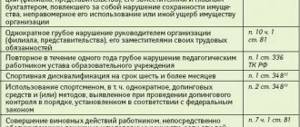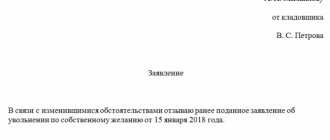The process of terminating the relationship between employer and employee in Russia is clearly regulated by labor legislation. Despite this, employers systematically make mistakes when terminating mutual cooperation with workers. This risks challenging the dismissal in court and reinstating the plaintiff to his previous position.
For each dismissal option, there is a specific sequence of actions and appropriate documentary support. Compliance with the law upon dismissal ensures that there are no claims from the former employee to the employer and vice versa.
Regulations
The Labor Code of the Russian Federation is the main regulatory document regulating the process of termination of an employment contract. The modern version of the Labor Code of the Russian Federation was adopted by the State Duma and approved by the Federation Council in December 2001.
The procedure for termination of the contract is regulated by the thirteenth chapter of the code, which indicates the main reasons for dismissal:
- agreement of the parties;
- employee initiative;
- employer initiative;
- expiration of the contract;
- circumstances beyond the control of the parties.
Important
Termination of labor relations initiated by the employer is carried out with the participation of the trade union unit.
Also, the main legislative act regulating the process of mass layoffs of employees is the law “On Employment in the Russian Federation,” adopted in 1991.
On February 5, 1993, the “Regulations on the organization of work to promote employment in conditions of mass layoffs” was approved.
For your information
In 2004, regulations on unified forms were approved. According to this resolution, all documents accompanying the dismissal procedure must have a single unified form established by the regulations.
Resolutions of the Ministry of Labor of the Russian Federation in 2003 approved rules and instructions for working with work books.
Responsibility of the organization's leaders for forcing the signing of the application
It is not uncommon for an employee to be forced to sign a resignation letter of his own free will. This can be expressed in persistent conversations, constant calls “on the carpet” for the slightest reason, threats of dismissal for committing non-existent disciplinary offenses. There are cases of being forced to write an application with an open date in order to constantly keep the employee “on the hook”. It happens that management deliberately provokes an employee to commit a disciplinary offense in order to then offer him to leave on his own initiative as an alternative to dismissal under a more stringent article.
Of course, such coercion, carried out even in the mildest form, is illegal. At the same time, not everyone wants to bring a case to court.
In order to stop such actions, lawyers advise:
- Refuse to sign statements, citing knowledge of the laws. For example, you can point to the existence of Resolution of the Supreme Court of the Russian Federation No. 2 of March 17, 2004, which specifically emphasized that the dismissal of an employee on his initiative is possible solely as a result of the voluntary expression of the will of the applicant.
- Observe work discipline and do not succumb to provocations such as invitations to “relax” at work with strong drinks.
- Ask for orders from superiors that obviously cannot be carried out, give them in writing.
To resolve issues of coercion to sign an application, you can contact the labor inspectorate or court. If such a fact is proven, the head of the enterprise is brought to administrative responsibility under Art. 5. 27 Code of Administrative Offenses of the Russian Federation. It provides for the imposition of a fine on officials and individual entrepreneurs in the amount of 1 to 5 thousand rubles, and on a legal entity - from 30 to 50 thousand rubles. In case of repeated violations, officials and individual entrepreneurs are subject to fines of up to 20, and legal entities - up to 70 thousand rubles.
Violations against privileged categories of citizens are punished even more harshly. Thus, forcing pregnant women and women with children under three years of age to fire is punishable by a fine of up to 200 thousand rubles. and even compulsory work for up to 360 hours (Article 145 of the Criminal Code of the Russian Federation).
Video: forced resignation
At the initiative of the employee
In Art. 80 of the Labor Code of the Russian Federation states that the employee must inform the employer about the upcoming end of cooperation no later than two working weeks. In other words, he needs to write a statement addressed to the manager indicating the date of the upcoming dismissal. The period for two weeks of work begins to count from the day following the day the application is submitted.
Important
Working off is not a mandatory condition; the employer has the right to terminate cooperation with the hired worker without it, or without waiting for its completion.
The employee has the legal right to withdraw the submitted application before the end of work, then dismissal will not take place.
For your information
With the exception of a situation where management has already invited a new employee to fill a vacant vacancy in writing, who, according to labor legislation, can no longer be refused employment.
On the employee’s last day of work, a unified dismissal order is issued, which indicates the grounds for termination of the contract - Art. 80 of the Labor Code of the Russian Federation and the statement dated “date of writing the application.” The order is signed by the employer and the dismissed employee. If it is not possible to familiarize the employee with the order, then a note about this is made in the document.
Important
The law does not prohibit the dismissal of an employee on his own initiative during a period of temporary disability or regular vacation.
After signing the order, the employee being dismissed is returned with a work book, and the accounting department makes all necessary payments.
Procedure for registering dismissal at the initiative of an employee in 2021
Step 1. Writing an application by the employee
When an employee decides to end his relationship with his employer and begin voluntary dismissal, he needs to express his desire by drawing up a statement. If you can write both in advance at home and at work. A standard sheet of paper is used for this.
Application for resignation at own request sample 2018
The application for voluntary resignation must bear the date of its preparation - it is from this date that the days of compulsory service will be counted. It is permissible for the day of dismissal to fall on vacation or during a period of illness. This is not a violation if the dismissal is carried out at the initiative of the employee.
Also, the application must necessarily contain the personal living signature of the employee, since it confirms that the document was drawn up by him. Without a signature it is considered invalid. In this regard, sending an application by e-mail is allowed only when using a digital signature, which is analogous to a live signature and allows the sender to be identified.
The completed application can be submitted to the personnel department in person, or by mail and registered mail. The immediate supervisor of the person resigning can affix their visa to the document, but this step is not mandatory.
The received application must be recorded in a journal to record incoming correspondence. At the same time, it is checked for the presence of mandatory details and signatures. The employee must be warned that the working period begins to count from the next day.
The application must be submitted to the head of the company. By his decision, he can shorten the working period or remove it altogether. The director must express this intention on the statement by indicating an order.
Attention! If an employee refuses to work the established period, it is recommended to warn him in writing about the need for this, otherwise he may be subject to dismissal for absenteeism.
After completing the entire procedure, the application is stored along with other documents in your personal file.
Step 2. Drawing up an order to dismiss the employee
The personnel officer, on the basis of an application for voluntary dismissal from the employee, endorsed by the manager, issues the necessary order. To do this, you can use the standard form T-8, or T-8a, if the simultaneous dismissal of several employees is executed at once. The order can also be drawn up in any form on company letterhead.
The law does not establish an exact deadline for when this order must be issued. But this definitely needs to be done no later than the resigning employee’s final working day. It is not worth creating an order immediately after the manager has approved the application.
According to the law, an employee has the right to change his mind and withdraw the written application within two weeks. And if the order has already been created and registered by this time, it will need to be canceled by issuing another canceling order.
Attention! If an employee wants to go on vacation with subsequent dismissal, then two forms must be filled out. One is a leave order in the T-6 form, the other is a dismissal order in the T-8 form. Or the personnel officer has the right to develop his own order form, which will combine these documents.
How to issue a dismissal order - completed sample
In the column that contains information about the reason for termination of the agreement, it is necessary to write: “At the initiative of the employee, paragraph 3 of part 1 of Article 77 of the Labor Code of the Russian Federation.”
In the column about the document on the basis of which the order is issued, you must indicate information about the employee’s application - the date, the number of his entry in the incoming correspondence book.
The completed order must be registered in the order log and then submitted to the manager for signing.
Step 3. Familiarization of the employee with the issued order
After the personnel officer has completely drawn up the dismissal order, it must be handed over to the employee. The latter carefully reads the contents of this document, after which he puts his personal signature.
If a situation arises that the employee refuses to read the order, or for some reason cannot do it, then it is necessary to assemble a commission and make an act about it. A note indicating the execution of this document is made in the column intended for signature.
The employee has the right to submit a written request for a copy of the order in hand, and the administration cannot refuse him this.
Step 4. Indicating information about dismissal in your personal card
When a new employee gets a job in a company, a personal card is opened for him. This document contains not only information about him, but also information about his performance of work duties. Goskomstat has developed two forms of this document: T-2 should be used by commercial companies, and T-2GS (MS) - by state or municipal ones.
You might be interested in:
Declaration of conformity with working conditions: deadlines, where to submit, how to fill out
How to issue a personal card in form T-2
In 2013, it was allowed not to use standard forms, but to create your own, which would take into account the specifics of the company’s work. However, such documents must contain mandatory details.
To indicate information about dismissal, you must use the section “Grounds for termination of an employment contract.” Here you need to write down the date of dismissal, its reason and information about the document used to formalize the termination of the agreement. After all the data has been recorded, the personnel officer once again checks it for correctness and then confirms it with his signature.
Attention! The information on the dismissal card must be shown to the employee. He familiarizes himself with it and must also confirm his familiarization with a signature. When an employee refuses to sign a document, you need to write a statement about this event and attach it to the card.
Step 5. How to make an entry in the work book about dismissal
The Ministry of Labor determines the correctness of the entry of dismissal into the employee's employment record.
If dismissal is made at will, then the following entry must be made in the document: “The employment contract is terminated at the initiative of the employee, paragraph 3 of Article 77 of the Labor Code of the Russian Federation.” The deadline must be entered only on the basis of the issued dismissal order, information about which is also included in the labor report.
Important! The basis for dismissal must be Art. 77 Labor Code of the Russian Federation. Mention of Art. 80 is a blunder!
The entry made must be certified by the signature of an authorized person or the head of the company. It is no longer necessary to affix a stamp.
Once all the information has been entered, the employee must read it and endorse it with a signature.
An example of making an entry in a work record:
| 1 | 2 | 3 | 4 | ||
| Limited Liability Company "Astra" (LLC "Astra") | |||||
| 7 | 20 | 06 | 2011 | Hired in the packaging department as a foreman | Order No. 38-L dated June 20, 2011 |
| 8 | 06 | 02 | 2020 | The employment contract was terminated at the initiative of the employee, paragraph 3 of Article 77 of the Labor Code of the Russian Federation | Order No. 6-L dated 02/06/2018 |
| HR specialist Zhemchuzhnaya M.I. | |||||
| Reviewed by: Strakhova G.I. | |||||
If the responsible employee made a mistake when compiling a record, or made an incorrect wording, then he will be liable in the form of a monetary fine to the person resigning - he will need to pay the average earnings for those days when the citizen was deprived of the opportunity to work because of this blot.
Step 6. Drawing up a note-calculation for dismissal
With the help of a calculation note upon dismissal, the accountant determines the amount of cash payment that needs to be given to the resigning employee. A special document in the form T-61 is intended for this. It was developed and put into effect by the State Statistics Committee, which also compiled instructions for use.
Calculation note upon dismissal form T-61 sample filling 2018
This form consists of two parts. The personnel officer enters information on the front side - personal data about the employee, place and length of work, number of days of unclaimed vacation, etc. are indicated there.
On the reverse side, the accountant enters the data - here the monthly salary, tax amounts, and the total final payment in hand are determined.
Step 7. Give the employee a receipt
On the final day at work, the employee must receive all the money accrued to him.
Such payments include:
- Salary for the month of dismissal;
- Compensation for vacation days that remain used;
- Benefit or compensation if they were secured by an employment or collective agreement.
Sometimes a situation may arise that a resigning employee is not at work on the day of dismissal, and therefore cannot receive pay. This can happen, for example, due to illness or going on a business trip.
In this situation, the money remains in the company and must be issued on the day following which he expressed his desire to receive payment. If the company pays wages to bank cards, then the payment day can be postponed to the next banking day.
If there is dissatisfaction between the parties regarding the amount of payment, then on the day specified by law only that part on which there is no disagreement is transferred. The rest are being negotiated or legal proceedings are being initiated.
Attention! If, before resigning, an employee decides to go on vacation, then payment for unclaimed vacation may not be accrued to him.
Step 8. Handing over to the employee documents related to the former job
After the termination of the employment agreement has been completed, the employee must also be given the following documents:
- Employment history. This document, after the voluntary dismissal has been recorded, must be given to the employee on his final day at work. To confirm this fact, the employee puts a personal signature in a special labor movement journal. If it was not possible to hand over the document on the final day - for example, the employee fell ill or refuses to pick up the document, then a special notification must be sent to his postal address. It should contain an invitation to come and receive the book at the enterprise in person, or to express consent to send it by mail. As soon as the personnel officer sends such a letter, he is relieved of all responsibility for failure to hand over the book within the prescribed period.
- Salary certificate in form 182n, which the employee received in the organization for the last 2 years. The form of this document was established by the Ministry of Labor.
- A document indicating the amount of accrued contributions to the funds, as well as those transferred. For this document, the form developed by the Pension Fund is used.
- Duly certified copies of the requested documents. These may be extracts from orders, for the issuance of which the employee must submit a written request. The employer does not have the right to refuse to issue them.
- SZV-STAZH report for each month of work in the company. This form has been put into effect since 2021. If the certificates were not issued, then a fine of 50 thousand rubles may be imposed on the organization.
At the initiative of the employer
The reasons for termination of relations at the request of the employer are specified in Art. 81 Labor Code of the Russian Federation:
- forced reduction in the number of employees;
- termination of the organization's existence;
- discrepancy between the level of knowledge and skills of the employee and the position he occupies;
- the commission of an immoral act by an employee performing educational functions;
- change in the person who is the owner of the enterprise;
- regular failure to fulfill duties by an employee;
- a gross form of violation by the worker of the duties prescribed in the contract - absence from work without a good reason or appearing at work in an intoxicated state, disclosing secrets or personal data of other workers, committing theft, failure to comply with the requirements prescribed by labor protection;
- loss of trust in a person who has access to material goods;
- erroneous actions of the enterprise management that resulted in property damage;
- Providing workers with false documents when applying for a job.
Important
In the event of a complete cessation of the enterprise’s activities or staff reductions, it is necessary to inform employees about the termination of cooperation no later than two months in advance.
Such dismissals are not simple procedures and require the utmost care and strict compliance with the law on the part of the employer. In case of absenteeism or intoxication of a worker, the employer is obliged to draw up a corresponding report.
If intoxication is suspected, a medical examination must be arranged. After the employee writes an explanatory note, the issue of dismissal or other disciplinary punishment is decided.
For your information
It is unacceptable to terminate an employment relationship for absenteeism without receiving an explanation for the act from the employee.
Except in cases of complete liquidation of the organization, the employer does not have the right to terminate the contract with:
- pregnant women (if an open-ended contract was concluded) and women (single parents, guardians) with children under three years of age;
- single mothers (single parents, guardians) with children under 14 years of age or disabled minors;
- with a parent who has 3 or more children, including a child under three years old, and the second parent is not employed.
To terminate a contract with a hired worker due to lack of necessary qualifications, a special commission is created whose purpose is to prove that he cannot cope with the work properly.
Is it possible to refuse to dismiss an employee or not?
An employee has the right to terminate the employment contract concluded between the employer and employee.
To do this, the employee must write a statement. If the document is drawn up correctly, then the director has no right to prohibit him from resigning, since labor relations are based on the principle of voluntariness.
Forced labor is prohibited in the country. Thus, refusing to dismiss an employee violates current labor laws.
The only condition for dismissal, which is enshrined in law, is the need to notify of your desire no later than 2 weeks before the date of termination of the relationship. Therefore, the administration has the right to refuse immediate dismissal, since the warning period in this case is violated.
However, there are situations when an employee is not required to work the established time - all these cases are stipulated by law. To use them, the employee must submit documents confirming this when submitting an application.
By agreement of the parties
There are situations when both the employee and the employer no longer want to cooperate. In this case, dismissal is provided by mutual consent, that is, by agreement of the parties. The basis is Art. 78 Labor Code of the Russian Federation.
This method of terminating the contract is mutually beneficial for both parties. If the initiator of dismissal is an employee, then he must submit an application where he asks to dismiss him using the concluded agreement. In cases where the employer wishes to terminate cooperation, the organization’s management sends the employee a letter of resignation by mutual consent.
For your information
Before drawing up an agreement, both parties negotiate its terms - the amount of payments, the date of dismissal, and other compensation.
After agreeing on the terms of the agreement, the document itself is issued, which is signed by both parties.
The next step is for the personnel department to issue a dismissal order, familiarize the employee with it and return the work book to him. As with all other dismissal options, all amounts due are paid.
Important
Dismissal by agreement is allowed during a period of temporary incapacity for work or regular vacation.
The presence of an agreement signed by the parties presupposes that the parties do not have any material claims against each other.
Who can't be laid off?
Any order to lay off a hired employee is based on strict compliance with the articles of labor legislation, be it dismissal due to staff reduction or for another reason. Meanwhile, it is not so uncommon for people to be unlawfully dismissed on flimsy pretexts, out of a feeling of personal hostility, or for other illegal reasons. In such a situation, a citizen has the right to seek protection from the judicial authorities, or from the supervisory authority - the labor inspectorate.
If the illegality of dismissal is proven, the employer faces a fine. The injured employee can count on payment of compensation for forced absence, as well as for moral damage suffered by him. In addition, he must be reinstated in his position, and the entry in the work book must be corrected.
There are a number of categories of employees who cannot be fired under any pretext. These include:
- Women on maternity leave.
- Employees who are in the second or more trimester of pregnancy. To confirm her pregnancy, the employee must provide the HR department with a corresponding certificate from a medical institution.
- An employee who is on sick leave or on regular vacation. To fire him, you will need to wait until he returns to work.
- A woman raising a child under three years of age.
- Single mothers.
Dismissal of the listed categories of workers is a gross violation of labor legislation, sometimes entailing serious penalties, including criminal prosecution.
Due to circumstances beyond the control of the parties
Article 83 of the Labor Code of the Russian Federation provides a list of circumstances in the presence of which the cooperation between the worker and the employer is terminated, regardless of their will:
- conscription of an employee into the army;
- failure to be elected to office by the board of directors or other authorized meeting;
- reinstatement of a former employee in the workplace by a court order or decision of the State Labor Inspectorate;
- issuance of a court decision according to which the employee will not be able to further perform his duties;
- death of the employer or employee;
- recognition of the employee as incompetent based on the conclusion of the medical commission;
- emergency situations associated with natural disasters, military operations;
- the entry into force of an administrative penalty, which makes it impossible for the employee to carry out his functions;
- cancellation of the decision of the State Tax Inspectorate or a court order on the reinstatement of a former employee;
- expiration of the validity period of special permits and permits, the availability of which is required by law;
- expiration of the period of validity of access to state secrets.
Important
When a person who previously held it is reinstated in a position, an administrative penalty comes into force, or the validity period of a permit expires, the employer must offer the employee other vacancies at the enterprise.
If the contract is terminated due to such circumstances, they must be documented. The contract can be terminated only on the basis of a summons, court decision, medical commission, death certificate and other documents.
In what cases can you quit without working?
The law establishes cases when compulsory service is not required. But in this situation you need to provide a supporting document.
Such situations include:
- Transfer of a spouse to a place of work in another locality, city, etc. (a summons certificate is provided);
- Admission to full-time studies (based on the enrollment order);
- The employee's first retirement. This right is granted once. If a pensioner gets a job again and quits again, this will have to be done on a general basis with a two-week period of work;
- If the company’s management violates the provisions of the Labor Code - it does not pay wages on time, conditions in the workplace have worsened, etc.
Working off
Working time refers to the period that an employer needs to find a new employee to fill a vacant vacancy. It begins to be calculated from the day following the day the application is submitted.
Important
Work must be counted in calendar days, not in work shifts.
Also, during the working period, a hired worker may be on regular leave, leave without pay, or have a certificate of incapacity for work. The work period will not be extended due to this, and the termination of cooperation will take place upon expiration of its term.
For example, an employee warned in writing about leaving on 02/01/2018, the two-week work period is counted from 02/02/2018. Thus, the contract will be terminated on February 15, 2018.
The law provides for situations when work is reduced to three calendar days:
- dismissal occurs during a probationary period - Article 71 of the Labor Code of the Russian Federation;
- employment was carried out for the duration of seasonal work - Article 296 of the Labor Code of the Russian Federation;
- A fixed-term contract was concluded for a period of up to 2 months.
Important
The work period of the head of the enterprise is 1 month.
In Art. 80 of the Labor Code of the Russian Federation names the conditions under which working off is illegal:
- approaching retirement age and retirement;
- enrollment in an institute, technical school, college and other educational institutions;
- violation by the employer of labor legislation or other acts;
- other situations.
For your information
In such situations, dismissal occurs on the day the employee chooses.
Is it possible to quit while on a business trip?
The law also does not prohibit submitting an application while on a business trip. And the administration cannot refuse dismissal if the document is drawn up correctly and contains all the necessary details.
The dismissal procedure follows the same procedure as a simple dismissal. This is due to the fact that the employee completely retains his workplace during the trip.
It is best to send the application by registered mail in paper form. To submit it via email, you must have an electronic signature.
After the employee returns from a business trip, and if the period of service has already ended, he needs to receive all the payments intended for him and a work book.
If, due to dismissal, an employee was recalled from a business trip, then he must hand over all travel allowances for days not worked. Or this money may be withheld from the settlement benefit.
Is it possible to avoid working out?
As mentioned above, working hours are established only at the request of the employer. In a situation where the manager is not against terminating the contract on the day the application is submitted, then in the application he puts the note “dismiss without working”, and the personnel employee terminates the contract on the same day.
Information
Valid reasons for terminating a contract without waiting for the expiration of work are the employer’s violation of his duties. This may include delayed wages, an unequipped workplace, violations of the payment of vacation pay and other obligations of the employer specified in the contract.
The legislation does not clearly establish other conditions for the absence of work, but in practice there are a number of circumstances recognized by the court and the labor inspectorate as valid for terminating a contract without work:
- employee's health status;
- changing of the living place;
- family circumstances (illness of parents, children, spouses, long business trip of a spouse);
- having children under 14 years of age, or having 3 or more dependent children under 16 years of age;
- the employee's pregnancy.
Nuances of labor disputes
Issues of voluntary dismissal are among the easiest when considering labor relations issues. Nevertheless, disagreements still appear. Most often, disputes are present under the following circumstances:
- The administration of the organization openly refuses to accept the application for dismissal or its withdrawal.
- The manager forces the employee to write a letter of resignation.
- Dismissal is made ahead of schedule.
If you refuse to accept the application or its withdrawal, the easiest way out is to send these documents by a valuable letter with acknowledgment of delivery. It is impossible to avoid receiving such a letter.
To resolve issues of coercion to sign an application or early dismissal, only court proceedings will help. Usually such issues are resolved in favor of the employee. And at the same time, there is no need to worry about paying fees, since workers are exempt from legal costs when resolving such disputes (Article 393 of the Labor Code of the Russian Federation). If the court decision is positive, the employee is subject to immediate reinstatement at work with payment of all compensation.
Entry in the work book
An entry on the termination of employment relations is made in the book strictly on the day the dismissal order is issued. Depending on the type of dismissal, the entries in the books vary.
In the job information column, it is allowed to use the wording “ dismissed ”, “ employment contract terminated ”, “ terminated ”. After the entry is made, the signature of the employee who is responsible for maintaining the books is affixed.
On the last day of work, the employee gets acquainted with the entry made in the book, makes the entry “acquainted” in it and signs. He must also sign for the receipt of the work in the journal for recording the movement of books.
For your information
If the dismissed person did not show up for work on the last working day, then an act of absence is drawn up, and a letter is sent to the worker’s address by mail asking him to pick up the book or give permission to send it to the owner by mail.
Dismissal of an employee for disciplinary offenses
Another reason for forced dismissal may be repeated violation of labor discipline. Unlike dismissal due to staff reduction, deprivation of a citizen’s job is a type of disciplinary sanction. At the same time, dismissal is the most extreme measure of punishment for a negligent employee. The procedure for its use is prescribed in paragraphs No. 5-10, Article No. 81 of the labor legislation of the Russian Federation.
To apply such a serious penalty, the management of the organization must have compelling reasons. First of all, they mean repeated violations of labor discipline and internal work regulations. For minor violations, or violations committed for the first time, the Labor Code provides for lighter punishments - a warning, deprivation of a bonus, a reprimand. And only after this, when a person, fully aware of the possibility of more serious penalties, continues to commit certain offenses, can a more serious impact be applied to him in the form of deprivation of work.
The following offenses are considered gross violations of the labor order:
- Systematic absenteeism. Absenteeism is considered to be a long absence, more than four hours, of an employee from his workplace. However, the employee does not have any valid excuse for his absence.
- Being at work under the influence of alcohol, drugs or psychotropic drugs.
- Disclosure to employees of certain confidential data constituting an official or commercial secret. The list of such classified information is prescribed in by-laws, and can also be issued by an internal order of the organization. It does not matter whether the citizen disclosed secret information to outsiders for selfish reasons or through negligence.
- Theft of someone else's property committed while a person is performing his job duties. For labor legislation, the value of the stolen property does not matter, whether it belonged to the company or colleagues - in all situations, theft is considered a serious disciplinary offense.
- Waste of accountable funds belonging to the organization by a person responsible for their safety.
- Intentional damage to the property of an enterprise, as well as unintentional damage caused to the property of an organization by a person under the influence of alcohol or drugs.
- A gross violation of safety regulations by a worker, if as a result of his actions other workers were injured or a serious threat to their lives was created.
- For employees in a certain field of activity - teachers, law enforcement officers - a gross violation of labor discipline is considered a violation of public ethical standards, expressed in the commission of some kind of immoral offense. This includes appearing in a public place while intoxicated.
- Also, the reason for separation may be the loss of trust of the enterprise management in the employee. This applies to people working with certain material or monetary values.
All of the above reasons for imposing a disciplinary measure such as dismissal on a citizen must be documented. For each case of gross violation, a commission is created, which includes representatives of management, trade unions and colleagues of the offender.
Based on the results of the proceedings, an act is drawn up, on the basis of which a decision is made on the measure of influence on the offender. If a decision is made to dismiss this employee, management issues a corresponding order, which contains a mandatory reference to the reason - misconduct and an official document drawn up in this regard by the production commission.
Payments and compensation upon dismissal
Important
On the day the cooperation with the worker ends, the employer is obliged to make all payments required by law to the dismissed person.
The legislation establishes what payments an employee should receive on the day of departure, regardless of the form of dismissal:
- salary for days worked in the month (including all allowances, bonuses and other payments);
- compensation for the days of the next vacation that the dismissed person did not have to use;
For your information
Also, many enterprises provide for mandatory payments upon dismissal, provided for by the organization’s collective agreement and other internal documents.
Upon dismissal by mutual agreement, other payments are possible, which are specified in the agreement concluded between the parties.
When laying off workers or liquidating an organization, in addition to standard payments, the company pays severance pay. It is the average salary of an employee per month. In some situations, severance pay is paid for two or three months.
In some cases, the law provides for the employer to pay the dismissed person an average two-week salary:
- dismissal due to conscription into the ranks of the RF Armed Forces;
- reinstatement of a former employee in the workplace by a court decision or State Labor Inspectorate;
- the employee’s refusal to be forced to transfer to another position, necessary for him in connection with the results of the medical examination;
- declaring an employee incompetent to perform his functions;
- the employee’s refusal to further cooperate in connection with a transfer to work in another location together with the employer;
- the worker’s refusal to further cooperate due to changes to the contract.
Social guarantees for an employee upon dismissal due to staff reduction
Labor legislation, while allowing the dismissal of an employee without his consent, at the same time prescribes a number of social guarantees aimed at “mitigating” the losses caused to him, primarily of a financial nature. The dismissed employee must receive the following types of cash payments:
- After being laid off, within three days he must receive a full payment for all the days he worked in a given month. If the company has arrears in paying wages for previous months, then this must also be repaid within three days.
- If an employee did not manage to use his allotted paid annual leave this year, the company makes a compensation payment to him. Compensation is calculated for all days of rest unused by the employee.
- When a redundant employee does not receive another job at the enterprise upon dismissal, or does not immediately get another job, the employer is obliged to pay him severance pay within 2 months. Payments cease only upon expiration of the specified period, or upon the placement of the laid-off person in another job. The amount of severance pay in this situation is equal to the monthly salary of the dismissed person at the last place of work. To pay benefits, a citizen must present a work record book as confirmation that he has not yet found a new place of work.
- If a redundant employee was registered with the employment service, but was unable to find a suitable job within three months, the company from which he was fired is obliged to pay him severance pay for the third month. After this, all financial obligations of the former employer to this citizen cease. Unlike wages, severance pay is considered a form of social support and is therefore not subject to the 13 percent income tax. Also, no contributions to insurance funds - medical or pension insurance - are charged from these amounts.
Nuances
The legislation identifies categories of persons with whom certain subtleties apply when terminating a contract.
Dismissal during probationary period
During the trial period, both parties – the worker and the employer – can terminate the contract. In case of leaving on his own initiative, the subject is obliged to notify the manager no later than 3 days before ceasing to perform work duties.
Dismissal of a pensioner
Termination of labor cooperation with this category of citizens does not differ from the procedure for dismissing employees of other ages. The only caveat is the lack of work for a pensioner retiring.
Dismissal of a disabled person
Termination of a contract with a disabled person is possible for all reasons established by law.
Upon receipt of disability, the worker must submit a certificate of assignment of a disability group and a card with a rehabilitation program at the place of work. According to the restrictions specified in the card, the employer leaves him at his previous place of work or offers him other available vacancies at the enterprise. The worker's decision to transfer or leave must be documented. Dismissal is made on the basis of clause 8 of Art. 77 Labor Code of the Russian Federation.
Information
If there is a significant or complete loss of ability to work, the contract is terminated under Article 83 of the Labor Code of the Russian Federation.
Dismissal of a pregnant woman or maternity leaver
Dismissal of this category of employees is possible only in three cases - mutual agreement, a woman’s initiative and a complete cessation of the organization’s work.
Dismissal on sick leave
Releasing a job on the personal initiative of an employee during a period of incapacity for work is not prohibited by law.
For your information
If the employer initiates the termination of the employment contract, but on the day of dismissal the worker still has not recovered, then the date of dismissal is postponed to the day he returns to work due to the closure of the sick leave.
Dismissal while on vacation
An employee has every right to resign during any vacation (regular or without pay). This is the easiest way to avoid detention.
Termination of employment relations during vacation at the initiative of the employer is possible only upon liquidation of the organization.
Information
Also, dismissal during vacation is possible with mutual consent of the parties.
Dismissal at your own request during a probationary period
If a citizen is accepted after passing a test, then a simplified dismissal procedure also applies to him. This means that he must express his desire to end his employment relationship not in 14 days, as with a regular dismissal, but in just 3.
In addition, by agreement with the administration, the working period can be canceled altogether. However, it is necessary to obtain unequivocal consent, since such a failure to appear can be framed as dismissal for absenteeism.
Important! If the employee decides to quit and the probationary period has already passed, then he will have to work under general conditions for two weeks.
In the case where the dismissal during the probationary period is carried out by the employer on his own initiative due to low performance results, there will be no need to work off at all.
Is it possible to appeal dismissal?
You can argue with the legality of dismissal in the following cases:
- violation of the law by the employer upon termination of labor cooperation;
- the employer did not make a full final settlement with the former employee;
- the contract was terminated as a disciplinary sanction for a minor offense;
- dismissal at the request of the employer of an employee who is on vacation or has a certificate of incapacity for work;
- management put pressure on a subordinate;
- violation of the reduction procedure;
- other reasons.
For your information
If such violations are discovered, the dismissed person has the right to appeal the dismissal to the prosecutor's office, the State Inspectorate of Labor, or the court.
Is it possible to quit while on sick leave?
An employee has the right to file a resignation letter of his own free will, even if he is on sick leave at that time. It must be remembered that time of illness does not extend the period of compulsory service.
If the day of dismissal has arrived, and the employee still does not show up at his place, then the employer must still dismiss him within this period. It will be possible to move the date of dismissal only with the written consent of the employee.
You might be interested in:
Application for resignation at one's own request sample writing for 2021
The company is obliged to pay for sick leave that a former employee received as a result of his illness, even if the dismissal procedure has already taken place. This must be done within 10 days from the fact of presenting the sheet to the responsible person.
If an employee returns from sick leave and the working period has not yet ended, he is obliged to work until its end on a general basis.
Important! The requirement emanating from the administration to work off sick days that fell during the work period is illegal.
Reinstatement
If the procedure for terminating the contract was violated by the employer, the labor inspectorate or judicial authority makes a decision to restore the former worker who filed the complaint to his previous position. In this case, the enterprise is obliged to compensate financially for the period of forced downtime, based on the average monthly earnings of an illegally dismissed employee.
When reinstating the employee, the organization must cancel the order to terminate the employment relationship and issue an order to reinstate the dismissed worker, as well as pay for downtime due to the fault of the employer.
Dismissal procedure according to current legislation
Free legal consultation
Employment conditions do not always fully satisfy the employee. Conflict situations between employer and employee often occur. In order to avoid any misunderstandings, an employment contract should be concluded in advance, all points of which suit the employee. It must contain the following provisions:
- place of employment and position of the employee;
- salary amount;
- work schedule and day of departure;
- conditions for receiving compensation for work with hazardous components;
- the procedure for withholding funds from salaries and paying taxes;
- other features of the labor process.
The future employee should carefully study all points of the document so that after signing he does not encounter violations of his labor rights. The agreement is intended to ensure compliance with the Labor Code by the employer. He also disciplines the employee, since for failure to comply with the conditions specified in it, he can be fined or fired.
Additionally, an agreement can be concluded between the employer and the employee on financial responsibility (personal or collective), on the specifics of work, etc. The amount of payments that the employer is obliged to accrue for vacation, compensation or bonuses is specified separately. It also defines the conditions under which an employee can resign on his own initiative, or the dismissal occurs due to improper performance of official duties.
According to the provisions of the current legislation, it is possible to conclude a fixed-term contract (valid for a certain period) and an open-ended contract (done for an indefinite period). The reasons for terminating an employment contract may be the following:
- the validity period of the urgent document has expired;
- the employee expressed a desire to resign on his own initiative;
- the employer, for a number of reasons, initiates dismissal;
- the employee has become disabled or has reached retirement age;
- the employee moves to another locality;
- enrollment in a higher educational institution occurred;
- the employee was elected to a public office;
- the terms of the employment contract have changed and the employee is not satisfied;
- other reasons provided for by law.
Read also: MFC work schedule for March 8, 2021
The employee is considered dismissed upon expiration of the specified period of the fixed-term contract. He may also express a desire to resign on his own initiative. To do this, you must notify the employer of your decision two weeks before termination of your official duties. A written statement is issued indicating the exact date of dismissal.
An employer can dismiss an employee before the specified period without forcing him to work the 2 weeks established by law. However, there are exceptions to the rules. Workout is not required in the following cases:
- enrollment at the university occurred;
- relocation abroad required;
- the employee has taken up a public position;
- there is a transfer to another place of service according to the competition;
- need to care for a disabled child.
In all these situations, the reason for dismissal and the date of the desired end of work are indicated. The employer also has the right to request documents confirming the need for urgent termination of service. On the appointed day, the employee will be returned the work book with the appropriate mark and the required funds will be transferred (salary, bonuses, accumulated vacation pay, etc.).
The law reserves the right for employees to change their mind. Within 2 weeks after writing the application, you can cancel the decision to dismiss. The employer does not have the right to refuse, except in cases where another person has already been officially employed for the vacant position.
Dismissal at the initiative of the employer
In cases established by law, dismissal occurs at the initiative of the employer:
- the company closes;
- staff reductions are planned;
- the professionalism of the employee does not correspond to the position he occupies (the decision is made based on the results of the certification);
- there was a violation of the company's charter;
- work is not performed (recorded with disciplinary sanctions and fines);
- the employee did not show up for work or was absent during working hours for at least 4 hours.
The employer is limited by certain rules. Thus, it is impossible to fire an employee who is on official leave, on sick leave, on maternity leave or declared temporarily disabled.
If there is a reduction in a particular department, the employer must offer the person a place in another branch of the company. If an employee violates the established work rules, an order for his dismissal is issued.
Read also: Repair period under warranty
If a person is absent from the workplace for more than 4 hours, he is required to provide a written explanation indicating the reasons. Reasons that turned out to be unjustifiable for such a long absence are grounds for dismissal of an employee under an article of the Labor Code of the Russian Federation.
If valid reasons are given, the employer may require evidence (for example, a receipt from a pharmacy, a doctor's certificate, etc.). Weighty arguments for absence from work include road accidents, traffic jams, etc.
Other grounds for dismissal
In certain cases, dismissal occurs due to circumstances beyond the control of the parties. There may be the following reasons for this:
- a person is drafted into the army;
- the court decided to reinstate the employee who previously held the post;
- the court made a decision prohibiting a specific person from holding certain positions;
- the employee became disabled or died;
- the license was revoked and other cases established by the Labor Code.
In these cases, the employer is obliged to issue a dismissal order. The employee is notified and signs the document. Also, information about the reasons for dismissal is entered into the work book, with reference to the relevant article of legislation.
How long to work
One of the key questions that concerns an employee—how much work to do when leaving voluntarily—is not difficult. The established period is two weeks, but by agreement with the employer the employment contract can be terminated earlier. In accordance with Letter of Rostrud No. 1551-6 dated September 05, 2006, the deadline for dismissal at one’s own request begins the next day after the employer receives the application. The duration of the period is two weeks. Therefore, if the application is sent by mail, it is necessary to take into account the time it takes to deliver the postal item.
If the employer receives a document whose date does not correspond to a two-week period, he can:
- agree and resign on the date specified in the application;
- disagree and warn the employee about it.
When it is impossible for an employee to continue working (enrollment in an educational organization, retirement and other cases) and in cases of established violation by the employer of the Labor Code of the Russian Federation and other regulatory legal acts, local regulations, conditions of a collective agreement, agreement or employment contract, the employer is obliged to terminate the employment contract within the period specified in the application.
Instructions from ConsultantPlus experts will help you fill out all the documents correctly and take into account important details. Follow the link below to get free access.
to read.
Grounds for dismissal
There are many reasons why an employee may be fired. The Labor Code provides and regulates possible options. Article 77 of the Labor Code of the Russian Federation is devoted to the grounds for termination of labor activity.
The article contains 11 grounds for termination of an employment contract:
- Agreement of the parties. It is enshrined in the contract and signed by both parties.
- Employee initiative. Dismissal occurs based on the employee's application.
- Dismissal at the request of the employer. The grounds are described in Article 81 of the Labor Code of the Russian Federation.
InformationThey can be divided into 2 large groups: due to disciplinary sanctions, and reasons not related to the worker’s guilt.
- Dismissal due to expiration of the employment contract.
- Transfer of an employee, at his request or with his consent, to work for another manager or transfer to an elective position.
- Circumstances that do not depend on the will of the parties.
- An employee’s refusal to continue working due to a change in the owner of the enterprise’s property, with a change in the subordination of the organization (or its reorganization), with a change in the type of state or municipal institution.
- An employee’s refusal to continue working due to certain changes in the terms of the contract.
- Refusal of a subordinate to be transferred to work in another location together with the manager.
- The employee’s refusal to transfer to another job that is indicated for him due to health reasons or the employer’s lack of appropriate work.
- Violation of the rules for concluding an employment contract established by the Labor Code of the Russian Federation or other federal law, if this violation prevents further continuation of work.









